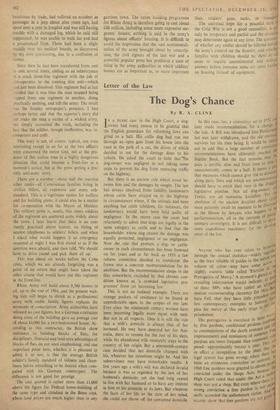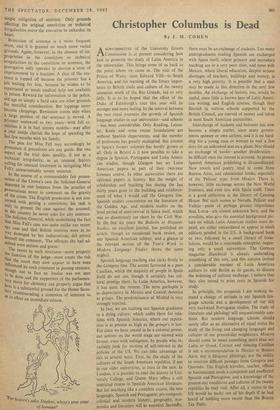Letter of' the Law
The Dog's Chance
By R. A. CLINE IN a recent case in the High Court, a dog- owner had every reason to be grateful that the English procedure for reforming laws can grind to a halt. His collie dog had run out through an open gate from his house into the road in the path of a car, the driver of which decided to sue for the damage done to his vehicle. He asked the court to hold that the dog-owner was negligent in not taking some steps to prevent his dog from menacing traffic on the highway.
But there is an ancient rule which stood be- tween him and the damages he sought. The law has always absolved from liability landowners whose cattle have strayed on to the highway in circumstances where, if the animals had been anything but cattle (children, for instance), the landowners would have been held guilty of negligence. In the recent case the court had reluctantly to admit that dogs are legally in the same category as cattle and to find that the householder whose dog caused the damage was equally protected, negligence or no negligence. Now the rule that protects a dog- or cattle- owner in such circumstances has been frowned on for years and as far back as 1953 a law reform committee decided to transform the frown into a concrete recommendation for its abolition. But the recommendation sleeps in the files somewhere, excluded by that chronic con- dition known as 'a crowded legislative pro- gramme' from yet becoming law.
This is not an isolated example. There are strange pockets of resistance to be found at unpredictable spots in the corpus of our law. Ever since the nineteenth century women have been becoming legally more equal with men. But not in all respects. Thus it is still the rule that a wife's domicile is always that of her husband. He may have deserted her for Aus- tralia, there to remain for the rest of his days, while his abandoned wife resolutely stays in the country of her origin. But a nineteenth-century case decided that her domicile changed with his, whatever her intentions might be. And this subservience may have remarkable results. A few years ago a wife's will was declared invalid because it was so regarded by the law of her husband's domicile; yet she had long ceased to live with her husband or to have any interest in him or his domicile or its laws. But whatever the facts of her life or the state of her mind, she could not throw off the unwanted domicile. In this case, too, a committee sat in 1952 a later made recommendations for a change the rule. A Bill was introduced into Parliamen but was later withdrawn, and the old anornal, survives for the time being. It would he un131 not to add that a large number of commttte recommendations have ultimately reached tb Statute Book. But the fact remains that the pace is terribly slow and from time to time.: unaccountably comes to a halt. It seems a that measures which cannot give rise to divisw,n along party lines and which are uncontrovers'!3 should have to await their turn in the stn.eLlis legislative pipeline. Not all dog-owners at Tories, nor all motorists Socialists. Yet ti abolition of the ancient doctrine about 011'4 must patiently await its moment to be discus.s; in the House by lawyers who haPPerl tO parliamentarians, all in the interests of Par,:5, mentary sovereignty. It is not difficult to .de,`lip more expeditious machinery for the mem of the law.
Anyone who has ever taken to brc'w''jil through the annual statistics--widely reg3r r as the least reliable of guides to the nature 3r °5 of crime—may have come acrciss slightly esoteric table called'Exercise o' it Prerogative of Mercy.' A moment's glance revealing information would indicate, at to those MPs who have tabled an all4;303 motion recommending clemency for M,i5„st ao hara Fell, that they have little preceoe"'fbeit few contemporary examples to buttress r 'ira, plea for mercy at this early stage Illhc prisonment. The prerogative is exercised in three tio by free pardons, conditional pardons Wild !if to commutations of the death sentence Fr imprisonment) and remissions of sentence; 0 pardons are more frequent than coMalalY: at' posed- approximately twenty a year. .The fb in effect a recognition by the State that 113' legal system has gone wrong, where there I been an erroneous conviction or sentence-op' 1960 free pardons were granted to eleven Pe to convicted under the Shops Acts, because High Court ruled that under the Act wrong conviction a free pardon is shop was not a shop. But even where there
at
) e n Oct sarily accorded the unfortunate victim. Art i records show that free pardons arc not gi`r
simple mitigation of sentence. Only grounds affecting the original conviction or technical irregularities move the executive to unharden its heart.
Remission of sentence is a more frequent event, and it is granted on much more varied grounds. Again,, however, in the absence of im- proprieties in the conviction or technical irregularities in the conviction or sentence, the prerogative only operates to shorten a term of imprisonment by a fraction. A slice of the sen- tence is lopped off because the prisoner has a Job waiting for him, because he wishes to be repatriated or needs medical help not available in prison. Reward for information to the police, old age or simply a hard case are other grounds for merciful consideration. But loppings never become choppings. Remission comes only when a large portion of the sentence is served. A prisoner sentenced to two years—with full re- mission it is in fact sixteen months—may after a year inside cherish the hope of spending the last few months with his family. The plea for Miss Fell may accordingly be Premature if precedents are any guide. But one aspect of the trial does qualify, if not as a technical irregularity, as an unusual feature calling for unusual treatment in mitigating Miss Fell's unwarrantably severe sentence. In the course of a commendably fair presen- tation of the Crown's case the Solicitor-General departed in one instance from the practice of Prosecutions never to comment on the gravity of the crime. The English prosecutor is not con- cerned with getting a conviction; his task is
hly to present the case against the accused; in this country he never asks for any sentence. The Solicitor-General, while underlining the fact that Miss Fell's case was quite unlike any recent sPY case and that British interests were in no Way damaged by her indiscretions, did permit himself the comment, 'The offences she had ad- mitted were serious and grave.' The resort to such strictures--more properly the function of the judge—must create the risk that the court may now appear to have been influenced by such comment in passing sentence, !hough not in fact so. Justice was not seen to be done and the supporters of the parliamen- tary move for clemency can properly argue that Oere is a substantial ground for the Home Secre- tary recommending a remission of ientence so as to effect an immediate release.
'For heaven's sake, Daphne, where's your sense of humour?'































 Previous page
Previous page